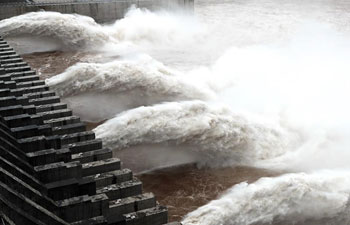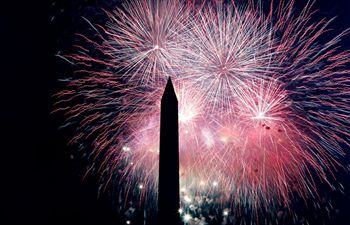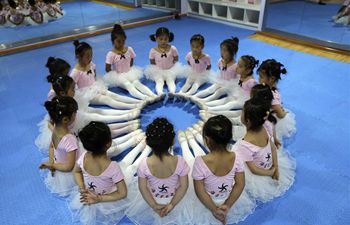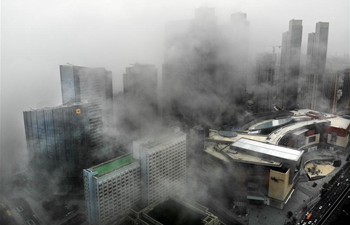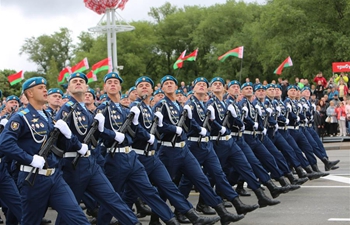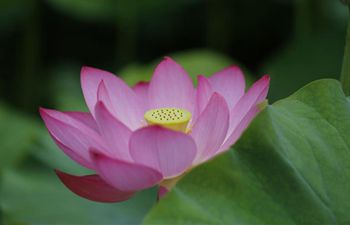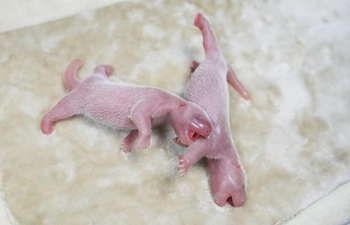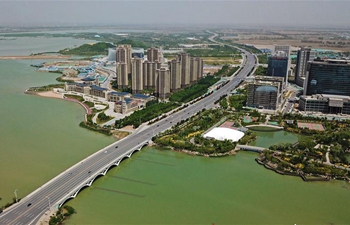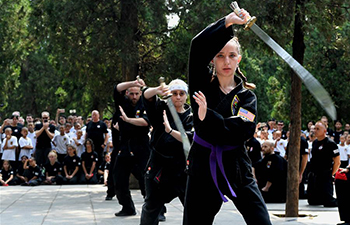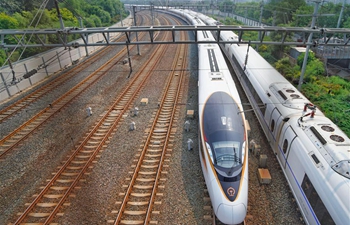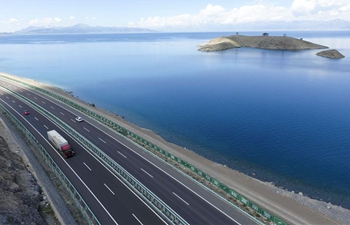
Syrian soldiers walk in the town of Saida, Daraa province, Syria, on July 5, 2018. The Syrian army on Thursday started an operation along the Syrian-Jordanian borderline in the countryside of the southern province of Daraa, as negotiations have renewed between the Russian side and the rebels there after a recent hiccup. (Xinhua/Ammar Safarjalani)
DAMASCUS, July 5 (Xinhua) -- The Syrian army on Thursday started an operation along the Syrian-Jordanian borderline in the countryside of the southern province of Daraa, as negotiations have renewed between the Russian side and the rebels there after a recent hiccup.
The War Media, the media wing of the Syrian army, said the Syrian troops captured nine border posts from the rebels within the administrative border of Daraa province Thursday, after capturing 12 villages near the border.
The government forces are now moving toward the town of Mataiyeh on the road toward the official Nasib border crossing with Jordan, which was the only operational border point between Jordan and Syria before the rebels captured it in 2015.
The report said there are 79 border posts on the Syrian side of the border with Jordan, which are small posts along the borderline different than the official crossing.
This comes as part of the wide-scale offensive the Syrian army unleashed two weeks ago against the rebels in the key province of Daraa.
The Syrian Observatory for Human Rights said Thursday that the Syrian army has expanded its control in Daraa province to 67 percent during the ongoing offensive.
The army in Daraa is fighting various rebel groups, including al-Qaida-linked Nusra Front and militants allied with the Islamic State (IS).
The battles in Daraa have lasted nearly two weeks, as part of the army's resolve to dislodge the rebels from the key province near the Jordanian border and from nearby areas in the countryside of Sweida and Quneitra in southern Syria.
So far, the army has succeeded in capturing several towns and villages in the eastern countryside of Daraa through military operations, while managing to enter other towns without a fight as some rebel groups accepted reconciliation deals with the government.
The reconciliation deals demanded the rebels hand over their heavy weapons to the army in exchange for a government pardon for those who abandon insurgency.
However, some ultra-radical groups rejected the reconciliation deal and continued to fight.
The observatory said negotiations have been agreed upon to continue after failing a day earlier between the rebels and the Russian side, which is representing the Syrian government.
The negotiations between the Russians and the militants in Daraa are backed by Jordan, which has a considerable sway of the militants there.
The negotiations mainly aim to establish reconciliation with rebels who want to go back under the government umbrella, and evacuate other militants who don't want to reconcile with the government.
But leaders of the al-Qaida-linked Nusra Front and militants allied with IS have reportedly rejected to evacuate, as they seem to have conditions or demands to accept such a deal, which was implemented in other Syrian areas in recent years when rebels accepted to leave to Idlib province in northwestern Syria.
Amid the progress of the army, either through military action or reconciliations, the UN High Commissioner for Refugees (UNHCR) on Thursday urged Jordan to open the border for those fleeing the battles in Daraa.
The UNHCR said the total number of displaced now stood at more than 320,000, with 60,000 of them gathered at the border crossing with Jordan.
Earlier in the day, state news agency SANA said that over 30,000 people returned to the town of Da'el in the northern countryside of Daraa after this town witnessed reconciliation.
SANA said the army on Thursday captured the town of Saida, which, it said, was the most dangerous rebel stronghold in the eastern countryside of Daraa. Its liberation constitutes an important step in eradicating the "terror" groups in the eastern countryside of Daraa.
Daraa has a symbolic significance as it was the birthplace of the Syrian war that erupted in 2011. Securing it will be a big victory for the Syrian army both symbolically and militarily as the rebels have used the Jordanian border to bring in arms and fighters throughout the Syrian war.





